(完整word版)现在完成时中瞬间动词变延续性动词总结
- 格式:doc
- 大小:36.01 KB
- 文档页数:2
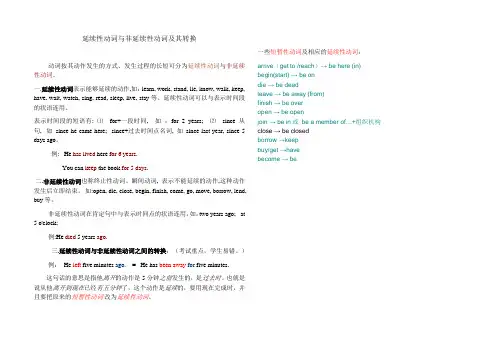
延续性动词与非延续性动词及其转换动词按其动作发生的方式、发生过程的长短可分为延续性动词与非延续性动词。
一.延续性动词表示能够延续的动作,如:learn, work, stand, lie, know, walk, keep, have, wait, watch, sing, read, sleep, live, stay等。
延续性动词可以与表示时间段的状语连用。
表示时间段的短语有: ⑴for+一段时间, 如:for 2 years; ⑵since从句, 如since he came here; since+过去时间点名词, 如since last year, since 5 days ago。
例: He has lived here for 6 years.You can keep the book for 5 days.二.非延续性动词也称终止性动词、瞬间动词, 表示不能延续的动作,这种动作发生后立即结束。
如:open, die, close, begin, finish, come, go, move, borrow, lend, buy等。
非延续性动词在肯定句中与表示时间点的状语连用,如:two years ago; at 5 o'clock;例:He died 5 years ago.三.延续性动词与非延续性动词之间的转换:(考试重点,学生易错。
)例:He left five minutes ago. = He has been away for five minutes.这句话的意思是指他离开的动作是5分钟之前发生的,是过去时。
也就是说从他离开到现在已经有五分钟了,这个动作是延续的,要用现在完成时,并且要把原来的短暂性动词改为延续性动词。
一些短暂性动词及相应的延续性动词:arrive(get to /reach)→ be here (in) begin(start) → be ondie → be deadleave → be away (from)finish → be overopen → be openjoin → be in或be a member of…+组织机构close → be closedborrow →ke epbuy/get →havebecome → be。
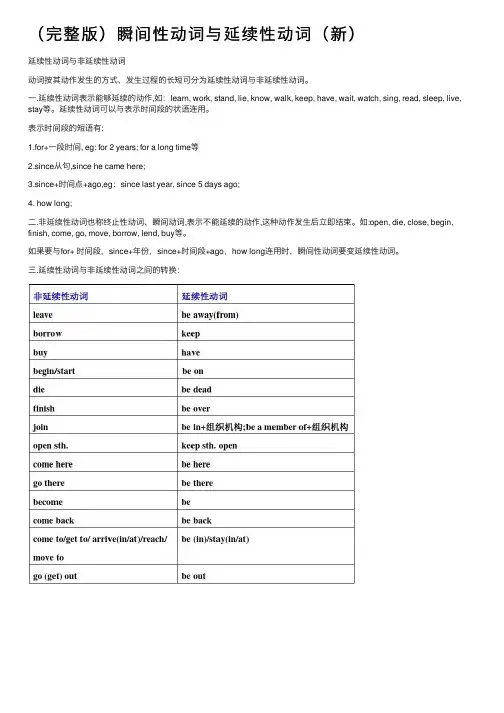
(完整版)瞬间性动词与延续性动词(新)延续性动词与⾮延续性动词动词按其动作发⽣的⽅式、发⽣过程的长短可分为延续性动词与⾮延续性动词。
⼀.延续性动词表⽰能够延续的动作,如:learn, work, stand, lie, know, walk, keep, have, wait, watch, sing, read, sleep, live, stay等。
延续性动词可以与表⽰时间段的状语连⽤。
表⽰时间段的短语有:1.for+⼀段时间, eg: for 2 years; for a long time等2.since从句,since he came here;3.since+时间点+ago,eg:since last year, since 5 days ago;4. how long;⼆.⾮延续性动词也称终⽌性动词、瞬间动词,表⽰不能延续的动作,这种动作发⽣后⽴即结束。
如:open, die, close, begin, finish, come, go, move, borrow, lend, buy等。
如果要与for+ 时间段,since+年份,since+时间段+ago,how long连⽤时,瞬间性动词要变延续性动词。
三.延续性动词与⾮延续性动词之间的转换:例:(1)他死了三年了。
误:He has died for three years.正:He has been dead for three years.正:He died three years ago.正:It is three years since he died.正:Three years has passed since he died.(2) 他来这⼉五天了。
误:He has come here for five days.正:He has been here for five days.正:He came here five days ago.正:It is five days since he came here.正:Five days has passed since he came here. (1)、(2)句中的die、come为终⽌性动词,不能与表⽰"段时间"的状语连⽤。
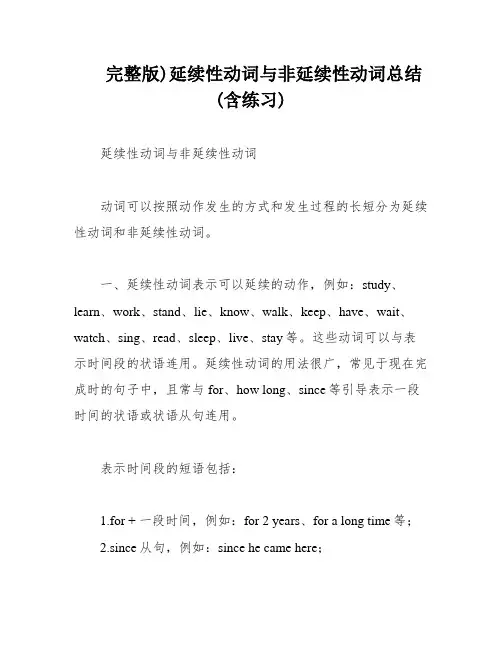
完整版)延续性动词与非延续性动词总结(含练习)延续性动词与非延续性动词动词可以按照动作发生的方式和发生过程的长短分为延续性动词和非延续性动词。
一、延续性动词表示可以延续的动作,例如:study、learn、work、stand、lie、know、walk、keep、have、wait、watch、sing、read、sleep、live、stay等。
这些动词可以与表示时间段的状语连用。
延续性动词的用法很广,常见于现在完成时的句子中,且常与for、how long、since等引导表示一段时间的状语或状语从句连用。
表示时间段的短语包括:1.for + 一段时间,例如:for 2 years、for a long time等;2.since从句,例如:since he came here;3.since + 时间点名词 + ago,例如:since last year、since 5 days ago;4.how long。
二、非延续性动词也称终止性动词、瞬间动词或点动词,表示不能延续的动作,这种动作发生后立即结束。
例如:open、die、close、begin、finish、come、go、move、borrow、lend、buy、move、happen、marry、arrive/reach、post、fall、break、lose、give、join、receive、hear、hear from、e等。
终止性动词也称为瞬间动词或点动词,在肯定句中一般不能与表示一段时间的状语或疑问词连用。
但是在否定句中,瞬间动词也可以和表示一段时间的状语或连词连用,这时的含义是好长时间没进行这个动作了,没进行此动作的状态就可以延续。
这类动词可以用于现在完成时态,但由于动作是瞬间完成的,所以不能与for或since引出的时间状语连用。
常见的这类动词包括:go、come、leave、arrive、lose、land、catch、join、kill、find等。
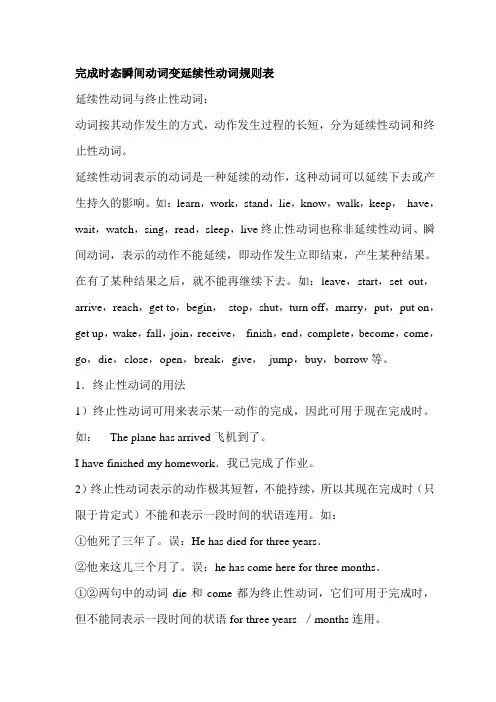
完成时态瞬间动词变延续性动词规则表延续性动词与终止性动词:动词按其动作发生的方式,动作发生过程的长短,分为延续性动词和终止性动词。
延续性动词表示的动词是一种延续的动作,这种动词可以延续下去或产生持久的影响。
如:learn,work,stand,lie,know,walk,keep,have,wait,watch,sing,read,sleep,live终止性动词也称非延续性动词、瞬间动词,表示的动作不能延续,即动作发生立即结束,产生某种结果。
在有了某种结果之后,就不能再继续下去。
如:leave,start,set out,arrive,reach,get to,begin,stop,shut,turn off,marry,put,put on,get up,wake,fall,join,receive,finish,end,complete,become,come,go,die,close,open,break,give,jump,buy,borrow等。
1.终止性动词的用法1)终止性动词可用来表示某一动作的完成,因此可用于现在完成时。
如:The plane has arrived飞机到了。
I have finished my homework.我已完成了作业。
2)终止性动词表示的动作极其短暂,不能持续,所以其现在完成时(只限于肯定式)不能和表示一段时间的状语连用。
如:①他死了三年了。
误:He has died for three years.②他来这儿三个月了。
误:he has come here for three months.①②两句中的动词die和come都为终止性动词,它们可用于完成时,但不能同表示一段时间的状语for three years /months连用。
那这两句如何译成英语呢?我们可采用下列方法:A.用能够表示持续状态的相应的延续性动词替换句中的终止性动词。
如:①He has been dead for three years.②He has been here for three months.将短暂性动词改为相应的延续性动词或短语和一段时间连用,其常用的方法有如下几种:a.用相应的延续性动词替换的主要有:buy→have,borrow→keep,come /go /become→be,catch /get a cold→have a cold,get to know→know等。
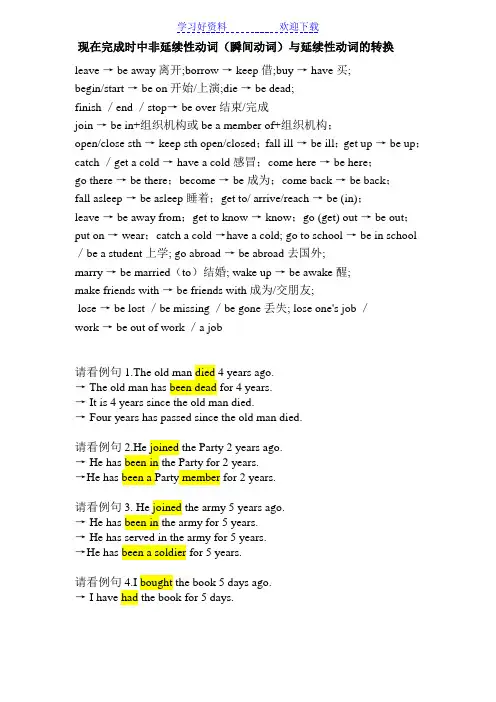
现在完成时中非延续性动词(瞬间动词)与延续性动词的转换leave → be away离开;borrow → keep借;buy → have买;begin/start → be on开始/上演;die → be dead;finish /end /stop→ be over结束/完成join → be in+组织机构或be a member of+组织机构;open/close sth → keep sth open/closed;fall ill → be ill;get up → be up;catch /get a cold → have a cold感冒;come here → be here;go there → be there;become → be成为;come back → be back;fall asleep → be asleep睡着;get to/ arrive/reach → be (in);leave → be away from;get to know → know;go (get) out → be out;put on → wear;catch a cold →have a cold; go to school → be in school /be a student上学; go abroad → be abroad去国外;marry → be married(to)结婚; wake up → be awake 醒;make friends with → be friends with成为/交朋友;lose → be lost /be missing /be gone 丢失; lose one's job /work → be out of work /a job请看例句1.The old man died 4 years ago.→ The old man has been dead for 4 years.→ It is 4 years since the old man died.→ Four years has passed since the old man died.请看例句2.He joined the Party 2 years ago.→ He has been in the Party for 2 years.→He has been a Party member for 2 years.请看例句3. He joined the army 5 years ago.→ He has been in the army for 5 years.→ He has served in the army for 5 years.→He has been a soldier for 5 years.请看例句4.I bought the book 5 days ago.→ I have had the book for 5 days.。
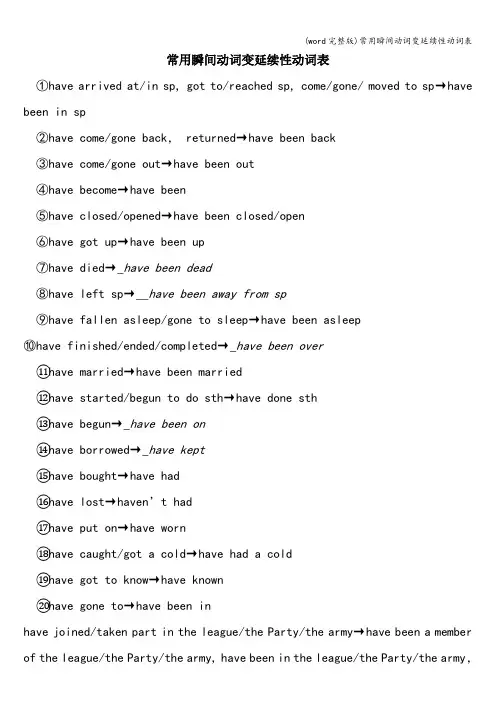
常用瞬间动词变延续性动词表①have arrived at/in sp, got to/reached sp, come/gone/ moved to sp→have been in sp②have come/gone back, returned→have been back③have come/gone out→have been out④have become→have been⑤have closed/opened→have been closed/open⑥have got up→have been up⑦have died→_have been dead⑧have left sp→__have been away from sp⑨have fallen asleep/gone to sleep→have been asleep⑩have finished/ended/completed→_have been over⑪have married→have been married⑫have started/begun to do sth→have done sth⑬have begun→_have been on⑭have borrowed→_have kept⑮have bought→have had⑯have lost→haven’t had⑰have put on→have worn⑱have caught/got a cold→have had a cold⑲have got to know→have known⑳have gone to→have been inhave joined/taken part in the league/the Party/the army→have been a member of the league/the Party/the army, have been in the league/the Party/the army,have been the Party's member/the league member/the soldier。

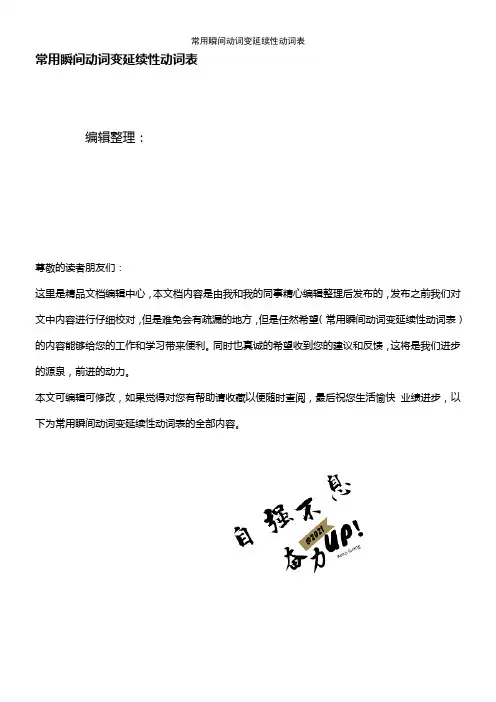
常用瞬间动词变延续性动词表编辑整理:尊敬的读者朋友们:这里是精品文档编辑中心,本文档内容是由我和我的同事精心编辑整理后发布的,发布之前我们对文中内容进行仔细校对,但是难免会有疏漏的地方,但是任然希望(常用瞬间动词变延续性动词表)的内容能够给您的工作和学习带来便利。
同时也真诚的希望收到您的建议和反馈,这将是我们进步的源泉,前进的动力。
本文可编辑可修改,如果觉得对您有帮助请收藏以便随时查阅,最后祝您生活愉快业绩进步,以下为常用瞬间动词变延续性动词表的全部内容。
常用瞬间动词变延续性动词表①have arrived at/in sp, got to/reached sp, come/gone/ moved to sp→have been in sp②have come/gone back, returned→have been back③have come/gone out→have been out④have become→have been⑤have closed/opened→have been closed/open⑥have got up→have been up⑦have died→_have been dead⑧have left sp→__have been away from sp⑨have fallen asleep/gone to sleep→have been asleep⑩have finished/ended/completed→_have been over⑪have married→have been married⑫have started/begun to do sth→have done sth⑬have begun→_have been on⑭have borrowed→_have kept⑮have bought→have had⑯have lost→haven't had⑰have put on→have worn⑱have caught/got a cold→have had a cold⑲have got to know→have known⑳have gone to→have been inhave joined/taken part in the league/the Party/the army→have beena member of the league/the Party/the army, have been in the league/the Party/the army, have been the Party’s member/the league member/the soldier。
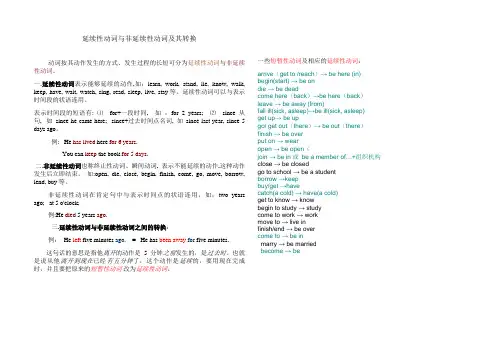
延续性动词与非延续性动词及其转换动词按其动作发生的方式、发生过程的长短可分为延续性动词与非延续性动词。
一.延续性动词表示能够延续的动作,如:learn, work, stand, lie, know, walk, keep, have, wait, watch, sing, read, sleep, live, stay等。
延续性动词可以与表示时间段的状语连用。
表示时间段的短语有: ⑴for+一段时间, 如:for 2 years; ⑵since从句, 如since he came here; since+过去时间点名词, 如since last year, since 5 days ago。
例: He has lived here for 6 years.You can keep the book for 5 days.二.非延续性动词也称终止性动词、瞬间动词, 表示不能延续的动作,这种动作发生后立即结束。
如:open, die, close, begin, finish, come, go, move, borrow, lend, buy等。
非延续性动词在肯定句中与表示时间点的状语连用,如:two years ago; at 5 o'clock;例:He died 5 years ago.三.延续性动词与非延续性动词之间的转换:例:He left five minutes ago. = He has been away for five minutes.这句话的意思是指他离开的动作是5分钟之前发生的,是过去时。
也就是说从他离开到现在已经有五分钟了,这个动作是延续的,要用现在完成时,并且要把原来的短暂性动词改为延续性动词。
一些短暂性动词及相应的延续性动词:arrive(get to /reach)→ be here (in) begin(start) → be ondie → be deadcome here(back)→be here(back)leave → be away (from)fall ill(sick, asleep)→be ill(sick, asleep)get up→ be upgo/ get out(there)→ be out(there)finish → be overput on → wearopen → be open(join → be in或be a member of…+组织机构close → be closedgo to school → be a studentborrow →keepbuy/get →havecatch(a cold) → have(a cold)get to know → knowbegin to study → studycome to work → workmove to → live infinish/end → be overcome to → be inmarry → be marriedbecome → be。
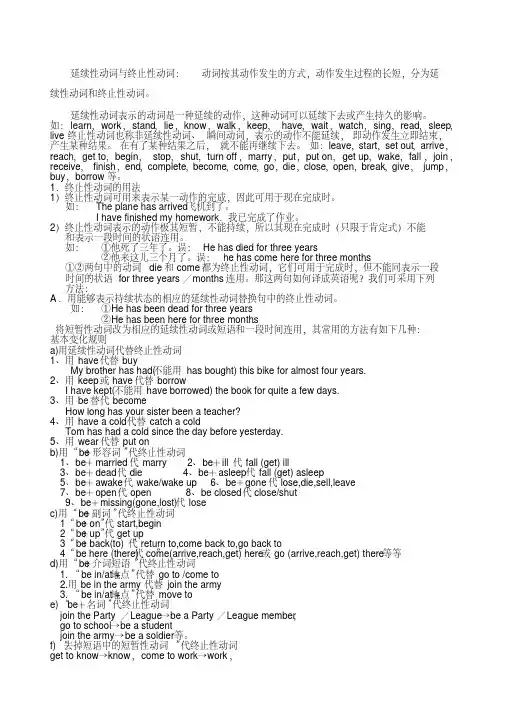
延续性动词与终止性动词:动词按其动作发生的方式,动作发生过程的长短,分为延续性动词和终止性动词。
延续性动词表示的动词是一种延续的动作,这种动词可以延续下去或产生持久的影响。
如:learn,work,stand,lie,know,walk,keep,have,wait,watch,sing,read,sleep,live终止性动词也称非延续性动词、瞬间动词,表示的动作不能延续,即动作发生立即结束,产生某种结果。
在有了某种结果之后,就不能再继续下去。
如:leave,start,set out,arrive,reach,get to,begin,stop,shut,turn off,marry,put,put on,get up,wake,fall,join,receive,finish,end,complete,become,come,go,die,close,open,break,give,jump,buy,borrow等。
1.终止性动词的用法1)终止性动词可用来表示某一动作的完成,因此可用于现在完成时。
如:The plane has arrived飞机到了。
I have finished my homework.我已完成了作业。
2)终止性动词表示的动作极其短暂,不能持续,所以其现在完成时(只限于肯定式)不能和表示一段时间的状语连用。
如:①他死了三年了。
误:He has died for three years.②他来这儿三个月了。
误:he has come here for three months.①②两句中的动词die和come都为终止性动词,它们可用于完成时,但不能同表示一段时间的状语for three years /months连用。
那这两句如何译成英语呢?我们可采用下列方法:A.用能够表示持续状态的相应的延续性动词替换句中的终止性动词。
如:①He has been dead for three years.②He has been here for three months.将短暂性动词改为相应的延续性动词或短语和一段时间连用,其常用的方法有如下几种:基本变化规则a)用延续性动词代替终止性动词1、用have代替buyMy brother has had(不能用has bought) this bike for almost four years.2、用keep或have代替borrowI have kept(不能用have borrowed) the book for quite a few days.3、用be替代becomeHow long has your sister been a teacher?4、用have a cold代替catch a coldTom has had a cold since the day before yesterday.5、用wear代替put onb)用“be+形容词”代终止性动词1、be+married代marry2、be+ill代fall (get) ill3、be+dead代die4、be+asleep代fall (get) asleep5、be+awake代wake/wake up6、be+gone代lose,die,sell,leave7、be+open代open 8、be closed代close/shut9、be+missing(gone,lost)代losec)用“be+副词”代终止性动词1“be+on”代start,begin2“be+up”代get up3“be+back(to)”代return to,come back to,go back to代come(arrive,reach,get) here或go (arrive,reach,get) there等等4“be here (there)”d)用“be+介词短语”代终止性动词1.“be in/at +地点”代替go to /come to2.用be in the army 代替join the army3.“be in/at +地点”代替move toe) “ be+名词”代终止性动词join the Party /League→be a Party /League member,go to school→be a studentjoin the army→be a soldier等。
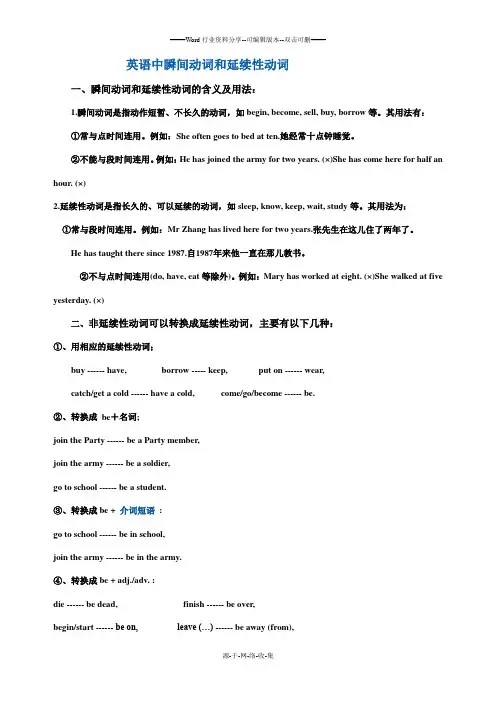
英语中瞬间动词和延续性动词一、瞬间动词和延续性动词的含义及用法:1.瞬间动词是指动作短暂、不长久的动词,如begin, become, sell, buy, borrow等。
其用法有:①常与点时间连用。
例如:She often goes to bed at ten.她经常十点钟睡觉。
②不能与段时间连用。
例如:He has joined the army for two years. (×)She has come here for half an hour. (×)2.延续性动词是指长久的、可以延续的动词,如sleep, know, keep, wait, study等。
其用法为:①常与段时间连用。
例如:Mr Zhang has lived here for two years.张先生在这儿住了两年了。
He has taught there since 1987.自1987年来他一直在那儿教书。
②不与点时间连用(do, have, eat等除外)。
例如:Mary has worked at eight. (×)She walked at five yesterday. (×)二、非延续性动词可以转换成延续性动词,主要有以下几种:①、用相应的延续性动词;buy ------ have, borrow ----- keep, put on ------ wear,catch/get a cold ------ have a cold, come/go/become ------ be.②、转换成be+名词;join the Party ------ be a Party member,join the army ------ be a soldier,go to school ------ be a student.③、转换成be + 介词短语:go to school ------ be in school,join the army ------ be in the army.④、转换成be + adj./adv. :die ------ be dead, finish ------ be over,begin/start ------ be on, leave (…) ------ be away (from),close ------ be closed, open ------ be open, fall asleep ------ be asleep.常见的瞬间动词变为延续性动词:1、go——be away2、come/arrive——be here3、come back——be back4、leave——be away(be not here)5、buy——have6、borrow——keep7、die——be dead8、begin——be on 9、finish/end——be over 10、open——be open11、close——be closed 12、lose——be lost 13、get to know——know14、turn on——be on 15、get up——be up 16、sit down——sit/be seated17、join——be in(…)或be a…member18、become——be a19、marry—— be marrie 20、fall asleep——be asleep 21、put on——be in /wear22、catch a cold——have a cold 23、go out——be ou例句:1、他买了这本书两年了。
现在完成时之瞬间动词转变为持续性动词(1)专题讲解:在完成时中,一个瞬间性动词(一次性动作)不能与表示一段时间的状语(for, since, how long等)连用,此时须将该瞬间动词改为延续性动词或状态动词.Eg:buy ( bought ) --- have / has had 买borrow (borrowed) --- have / has kept 借die ( died ) --- have / has been dead 死leave ( left ) --- have / has been away ( from ) 离开begin ( began ) --- have / has been on 开始join ( joined) --- have / has been in 参加、--- have / has been a ( party) membergo (went) --- have / has been there / in 去come/arrive/reach/get to --- have / has been here / in 来/到达end (ended) ----- have/has been over 结束eg. The film began five minutes ago.------The film has been on for five minutes.------It has been five minutes since the film began.用“be+形容词”代终止性动词.1、be+married代marry2、be+ill代fall (get) ill3、be+dead代die4、be+asleep代fall (get) asleep5、be+awake代wake/wake up6、be+open代open7、be closed代close/shut用“be+副词”代终止性动词1“be+on”代start,begin*2“be+up”代get up3“be+back(to)”代return to,come back to,go back to4“be here (there)”代come(arrive,reach,get) here或go (arrive,reach,get) there等等用“be+介词短语”代终止性动词1.“be in/at +地点”代替go to /come to2.用be in the army 代替join the army3.“be in/at +地点”代替move to四、巩固练习:》将瞬间动词变成延续性动词表:1. have arrived at/in....... got to/reached...... come/gone/moved to...... →2. have come/gone back/returned →3. have come/gone out →4. have become →5. have closed / opened→6. have fallen ill→7. have died →8. have left...... →*9. have fallen asleep/got to sleep →10. have finished/ended/completed →11. have married →12. have begun →13. have borrowed/bought →14. have/has gone to →15. have joined/have taken part in the league/the Party/the army→当堂过手练习:1、Her grandfather ______ for two years.A. diedB. has diedC. has been deadD. has been died2、His father ______ the Party since 1978 .&A. joinedB. has joinedC. was inD. has been in3、—Do you know him well— Sure .We _________ friends since ten years ago .A. wereB. have beenC. have becomeD. have made4、—How long have you ____ here—About two months .A. beenB. goneC. comeD. arrived5、Hurry up! The play __________ for ten minutes .A. has begunB. had begunC. has been onD. began6、It _____ ten years since he left the army .·A. isB. hasC. willD. was7、My parents ______ Shandong for ten years .A. have been inB. have been toC. have gone toD. have been8、has Mr White been a member of Greener China since he to ChinaA. How soon, comesB. How often, gotC. How long, cameD. How far, arrived9、The factory ____ since the February of 1988.A . has been open B. has opened C. was open D. opened10、Mary and Rose ____friends since they met in 2000.A. have madeB. have beenC. madeD. have become11、The meeting _____ for a week now.:A. has finishedB. has endedC. has been over been over12、Miss Gao ______ this school for nearly 5 years.A. has been inB. has come toC. has taughtD. has gone to13、Ben ______ a teacher for 4 years .A. has beenB. has becomeC. wasD. became14、I ______ home for a week.A. have returnedB. have been backC. returned been back to15、Ever since then, Tom _______a fan of classical music.A. has been C. has become D. have been。
现在完成时持续性动词与瞬间动词(也称结束性动词)用于现在完成时时,瞬间动词不与持续性时间状语(由for,since引导的)连用,要用必须改为延续性动词来表述。
现归纳一下非延续性动词到延续性动词的转换:瞬间动词——延续性动词have come/arrived ——have been herehave returned ——have been backhave come back ——have been backhave opened ——have been openhave closed ——have been closedhave joined ——have been in/been a member ofhave become ——have beenhave left ——have been awayhave bought ——have hadhave died ——have been deadhave begun ——have been onhave caught (a cold) ——have had (a cold)have ended\finished ——have been overhave married ——have been marriedhave got to know ——have knownhave borrowed ------- have been kepthave got up -------- have been uphave fallen ill/asleep ------- have been ill /asleephave gone out ------ have been outhave put on ------ have worn/been onhave gone to school------- have been a student瞬间动词——延续性动词have come ——have returned ——have come back ——have opened ——have closed ——have joined ——have become ——have left ——have bought ——have died ——have begun ——have caught (a cold) ——have ended\finished ——have married ——have got to know ——have borrowed -------have got up --------have fallen ill/asleep -------have gone out ------have put on ------have gone to school-------。
现在完成式中瞬间性动词如何变为延续性动词。
在完成式中,一个瞬间性动词(一次性动作如buy,borrow,die,leave,begin,join等)不能与表示一段时间的状语(for, since, how long等)连用,此时须将该瞬间动词改为延续性动词或状态动词.
如:He borrowed a book two days ago.(用现在完成式表达)
He has kept the book for two days.
他持有这本书两年了。
1、他三年前买了一辆车。
___________________________________
2、他两年前参了军。
___________________________________
答案:1、He has had a car for three years.或He has bought a car. 或He bought a car three years ago.
2、He has been in the army for two years.或He has joined the army.
He joined the army two years ago.
切记:有些动词是非延续的,在此用法中要换成其相对应的延续性动词:
His father has died.
His father has been dead for three years.
他父亲已经去世三年了。
She has joined the Party/League.
She has been in the Party/ League for two months.=She has been a Party/ League member for two months.
他已经入党/团两个月了。
The film has started/begun.
The film has been on/ lasted since 5 minutes ago.
电影已经开始5分钟了。
He has gone to Yangzhou.
He has been in Yangzhou for 3 days.
他已经去扬州三天了。
【习题】When Jack arrived he learned Mary __________ for almost an hour.(leave) 答案:had been away。